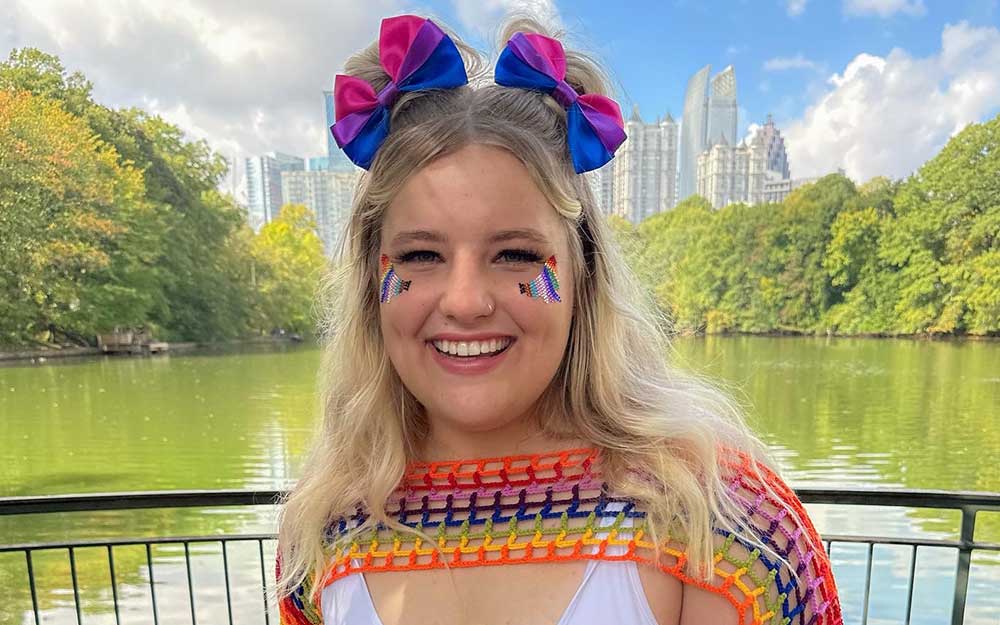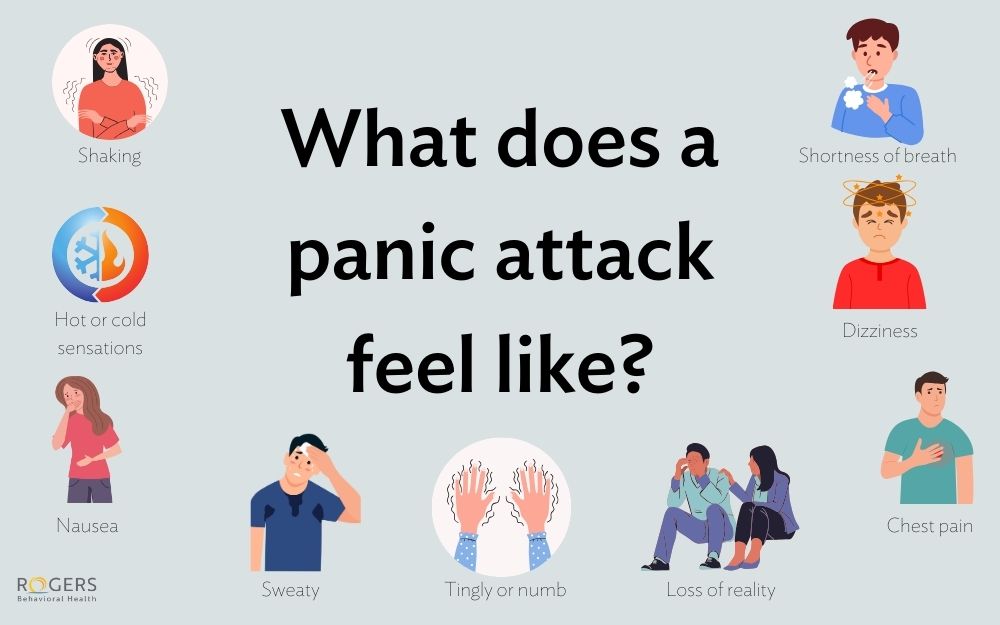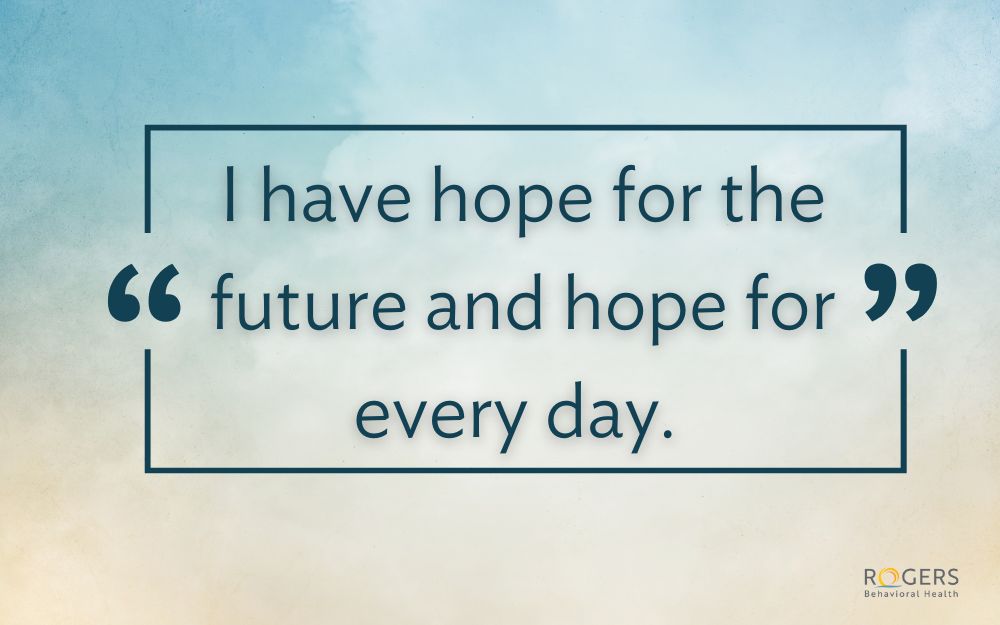Teagan’s OCD story: How Rogers’ treatment helped her come to terms with her sexual orientation OCD
Posted on 11/29/23 07:32:am
Share this article:
Sexual orientation OCD (SO-OCD) involves significant doubt regarding an individual’s sexual orientation. A person may experience intrusive and distressing thoughts questioning whether they are gay or straight, or for those who identify as heterosexual, may fear being or becoming gay/lesbian/queer. Individuals who experience SO-OCD or gender identity OCD are not homophobic or transphobic, although the distress that these individuals experience from their thoughts may lead others to believe otherwise.
Former patient, Teagan, shares her own personal journey with Sexual orientation OCD (SO-OCD).
“My name is Teagan Miller. I'm 20 years old, and I've struggled with obsessive compulsive disorder my whole life. I was diagnosed with OCD when I was 11 years old, although I was not introduced to proper treatment until I was 17.
Throughout my early teens, the idea of me hiding my ‘true’ identity from the world began to pester me. Over the years, I grew more and more afraid that I was lying to myself about my sexuality.
COVID hit in 2020, and I was consumed by an eating disorder and obsessions relating to orthorexia, so I stayed distracted from the perpetual fear that I was somehow hiding my sexuality from myself. On Halloween of 2020, I contracted COVID and was quarantined in my bedroom for what was supposed to be two weeks. However, I didn't last but two days before my OCD got to an unbearable point. It felt as if it had happened overnight, but it was really a buildup of years’ worth of repressed fears that all exploded in my mind once I was isolated.
I saw a TikTok that said, ‘If you get butterflies when looking at the same gender, sorry… you're gay.’ Most people would hear this and either laugh or just move on without even questioning themselves, but not me and my doubt-infested thoughts. This sent me into a spiral like I’d never been in before. This wasn’t my first OCD theme*; however, it came on in the most panicky, complex way. It felt like I was coming to terms with my sexuality except the exact opposite was happening. I felt as if a switch was flipped in my mind, and I could no longer see the world or who I was the same. I began having multiple, intense panic attacks back-to-back and I had to expose my mom to COVID. I could no longer do it on my own. We started by trying to talk through the attacks while still six feet apart outside. But I was far more concerned about why my brain suddenly broke in this way, and I just needed my mama. No teenager wants to talk about the uncomfortable or taboo details of sexuality with their mother, but I was so far beyond caring. I just ‘NEEDED’ to know if I was gay…. like NOW!!
For weeks following my COVID experience, I was inconsolable. When I say I was having panic attacks all day every day, I mean it. My fear radar was past level 10 and stayed there consistently until the end of my treatment. I would physically shake noticeably 24 hours a day. Waking up was the worst because I'd jolt awake and be in the midst of a panic attack already before I could process that I was even conscious. I truly never had a single second break. I threw up every morning and sometimes throughout the day because my body couldn't handle the excessive amounts of fear I was carrying.
My mom, like most of us, researches online when something is wrong. She knew this was OCD based on her research and my previous diagnosis. Her research is what led us to exposure and response prevention therapy (ERP). At this point, I had been on a variety of medication concoctions, and nothing had been helpful. After learning that ERP was the gold-standard treatment for OCD and was just about the only thing left we hadn't tried, my mom searched for a therapist near me. She came across Rogers Behavioral Health, and they just so happened to have opened a new program right in our state.
I remember the day my parents told me about Rogers. I told them I was all in. I was desperate for any amount of relief. I had no idea what I was getting myself into, but I’m forever grateful I took this leap of faith in trusting the professionals.
My intake call was in early November, and I was told we would be getting a call soon about orientation. I was still trying to go to school, but I didn't make it out of the house much anymore. I would cry all day at school and have meltdowns in the bathroom. I got a text from my parents on Monday, November 30 that my orientation day would be the next day, December 1, 2020. The relief I immediately felt knowing I was no longer going to have to suffer this way on my own was indescribable.”
Starting treatment for OCD
“December 1 was a tough day. My mom and I masked up and walked into Rogers in Atlanta. We filled out paperwork and I was asked about my entire history. Going over my past in detail was difficult, but I felt very seen and understood by everyone who spoke with me. By the end of the day I was exhausted. After orientation, my night was full of uncertainty. I had just learned about ERP, and I was petrified about how that would look for me. I was scared that by doing ERP, I would “turn” into someone I didn't want to be.
Day one came and I was just as anxious as I had been everyday leading up to this point, and then some. My first exposure was to simply talk about my theme. OCD made me overanalyze how I worded things to “make sure” I was being honest and not hiding a single thing so even just talking about my thoughts was very difficult for me.
By the second week, I had moved on to my next exposure, which is what I considered to be my first ‘real’ exposure - watching a triggering music video. I watched it over and over and tears streamed down my face.
My therapist at Rogers, my behavioral specialist, and I made a list of exposures together. The number one exposure on the page was to attend a pride event in Atlanta wearing rainbows and all. I laughed out loud when I was told that this was being listed. I could not fathom ever being well enough to do this exposure, so I brushed it off knowing I wouldn't be facing it anytime soon.
I had a variety of exposures throughout my treatment and lots of ups and downs. I spent two months going to Rogers every day before I stepped down to intensive outpatient therapy, which was three days a week. I didn't complete every single exposure because there were a lot and some of them took me longer to overcome than we anticipated. But once I got to a stable, functioning point, I was discharged from treatment so I could rejoin my senior class and graduate high school a few months later.
I’m still trying to find the right words that accurately describe how complex my internal experience with treatment was and still is. It feels as if OCD can be so complicated. It’s hard to express EVERYTHING that I went through to enter recovery. I had a difficult time transitioning out of treatment. I had never lived without relying on my OCD to “keep me safe.” It was really scary going back to school and re-entering an environment that was unbearable for me just months prior.
Fast forward almost three years. I graduated high school on time, I started seeing an OCD specialist weekly, and I am happily working at my dream job. Life is not easy by any means, but it’s a heck of a lot easier to live with OCD rather than live according to OCD. I have done enough exposure work to where I can confidently live in the uncertainty about my sexuality these days.
I made a friend in an outpatient OCD support group that I joined a few months after leaving Rogers. She's my best friend now. I do everything with her, including attending the Atlanta Pride Festival in 2023. We had a blast. I was decked out in rainbow head to toe and loved every second of it. It was so empowering to look OCD in the eye and pour rainbow glitter on my head anyways. While we were at the festival, OCD showed up for me a few times, telling me, ‘You’re a ‘fraud,’ or ‘You’re only doing this for attention.’ I acknowledged the thoughts and kept on walking through the park. I've never seen so many rainbows in one place. it was a beautiful representation for how far I've come.”
For more information about sexual orientation OCD and gender identity OCD, read “Defining and treating sexual orientation OCD and gender identity OCD” by Rogers’ Dr. Jennifer Park, and Dr. Tarik Hadzic.
*An OCD theme is what an individual’s OCD is focused on or centered around.



